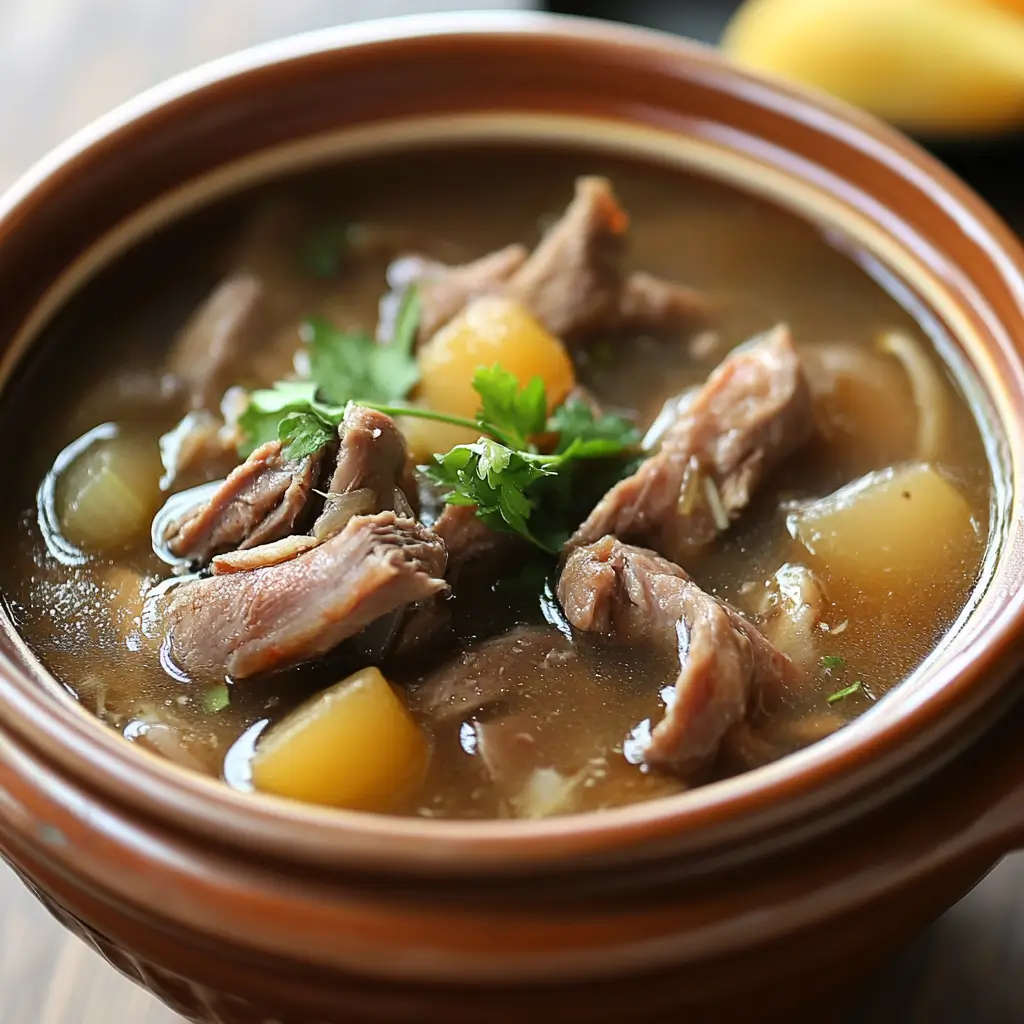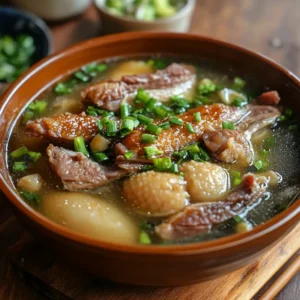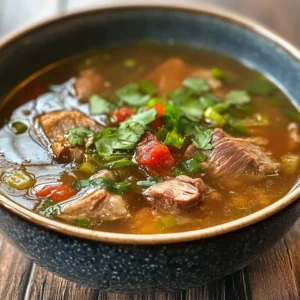If you’re wondering “Is duck soup healthy?”, you’re not alone. This dish, known for its rich flavor and nutritional value, has become a popular choice in various cuisines worldwide. In this article, we’ll explore the health benefits of duck soup, its nutritional profile, and how to make it a healthier option for your diet.
What Is Duck Soup?
Duck soup isn’t just a comforting, hearty dish; it also provides various health benefits that make it a nutritious choice, especially when prepared with wholesome ingredients. Here’s how duck soup can enhance your well-being:
1. Rich in Protein: Benefits for Muscle Growth and Repair
- High-Quality Protein: Duck meat is an excellent source of complete protein, which is essential for building and repairing muscles. The protein in duck soup aids in tissue regeneration and overall body repair, making it especially beneficial for active individuals or those recovering from injury.
2. Supports Immune Function Through Key Nutrients
- Immune-Boosting Ingredients: Duck soup often includes ingredients like ginger, garlic, and various herbs, all known for their immune-boosting properties. Ginger has anti-inflammatory effects, while garlic is packed with antioxidants and compounds that strengthen the immune system. The warm broth also helps soothe sore throats, providing relief during cold or flu season.
3. Promotes Skin and Hair Health
- Collagen for Skin and Hair: Duck bones are rich in collagen, which is essential for maintaining skin elasticity and supporting healthy hair growth. The collagen extracted during the cooking process can contribute to a more youthful appearance and stronger, shinier hair. This makes duck soup a beauty-boosting option in addition to being a nourishing meal.
4. Hydration and Electrolyte Balance
- Replenishing Electrolytes: Since duck soup is broth-based, it helps maintain hydration and replenish electrolytes, especially if you’re feeling unwell or dehydrated. The combination of water, minerals, and nutrients in the broth makes it an excellent choice for supporting hydration levels and electrolyte balance during illness or recovery.
5. Supports Digestion and Gut Health
- Gelatin and Digestive Benefits: The collagen and gelatin from duck bones may also support gut health. Gelatin helps seal the gut lining, which is beneficial for digestion and preventing leaky gut syndrome. Regular consumption of bone broth-based soups can promote a healthy digestive system and may even improve joint health over time.
Health Benefits of Duck Soup
While duck soup offers numerous nutritional benefits, there are some limitations to be mindful of, particularly related to its fat content, sodium levels, and potential allergens. Here’s what to consider when incorporating duck soup into your diet:
1. High Fat Content: Is It a Concern?
- Fatty Nature of Duck Meat: Duck, especially the skin, is known for its higher fat content compared to other meats. While fat is an essential nutrient, excessive consumption can contribute to weight gain and increase the risk of heart disease.
- Moderation is Key: To enjoy duck soup without overindulging in fat, consider using leaner cuts of duck (like duck breast) and removing excess skin before cooking. It’s also important to balance the dish with vegetables and other low-fat options.
2. Sodium Levels and Their Impact
- High Sodium in Broths and Seasonings: Many duck soup recipes use salty broths, soy sauce, or seasonings that can increase the sodium content. High sodium intake has been linked to high blood pressure and an increased risk of cardiovascular diseases.
- Manage Sodium Intake: To keep sodium levels in check, opt for low-sodium broths or make your own broth to control the salt content. Additionally, you can reduce the use of salty seasonings like soy sauce and experiment with herbs and spices for flavor.
3. Allergies or Sensitivities Related to Duck Soup Ingredients
- Potential Allergens: Some individuals may be allergic to duck meat or other common ingredients found in duck soup, such as gluten in certain broths or seasonings, or specific vegetables like celery or onions.
- Allergy Awareness: If you or someone you’re cooking for has food allergies or sensitivities, it’s important to check the ingredients carefully and make substitutions where necessary. For example, plant-based substitutes can be used for the duck, and gluten-free broths can be chosen to avoid gluten-related reactions.
By being mindful of these limitations, you can still enjoy duck soup in a balanced and healthy way. Moderating the fat content, reducing sodium, and considering allergies will help you get the most out of this nutritious dish.
Potential Drawbacks of Duck Soup
While duck soup offers numerous nutritional benefits, there are some limitations to be mindful of, particularly related to its fat content, sodium levels, and potential allergens. Here’s what to consider when incorporating duck soup into your diet:
1. High Fat Content: Is It a Concern?
- Fatty Nature of Duck Meat: Duck, especially the skin, is known for its higher fat content compared to other meats. While fat is an essential nutrient, excessive consumption can contribute to weight gain and increase the risk of heart disease.
- Moderation is Key: To enjoy duck soup without overindulging in fat, consider using leaner cuts of duck (like duck breast) and removing excess skin before cooking. It’s also important to balance the dish with vegetables and other low-fat options.
2. Sodium Levels and Their Impact
- High Sodium in Broths and Seasonings: Many duck soup recipes use salty broths, soy sauce, or seasonings that can increase the sodium content. High sodium intake has been linked to high blood pressure and an increased risk of cardiovascular diseases.
- Manage Sodium Intake: To keep sodium levels in check, opt for low-sodium broths or make your own broth to control the salt content. Additionally, you can reduce the use of salty seasonings like soy sauce and experiment with herbs and spices for flavor.
3. Allergies or Sensitivities Related to Duck Soup Ingredients
- Potential Allergens: Some individuals may be allergic to duck meat or other common ingredients found in duck soup, such as gluten in certain broths or seasonings, or specific vegetables like celery or onions.
- Allergy Awareness: If you or someone you’re cooking for has food allergies or sensitivities, it’s important to check the ingredients carefully and make substitutions where necessary. For example, plant-based substitutes can be used for the duck, and gluten-free broths can be chosen to avoid gluten-related reactions.
By being mindful of these limitations, you can still enjoy duck soup in a balanced and healthy way. Moderating the fat content, reducing sodium, and considering allergies will help you get the most out of this nutritious dish.
Duck Soup Variations and Their Impact on Health
Duck soup can be adapted in various styles, each offering distinct nutritional benefits. From traditional recipes to modern, health-conscious variations, there is a duck soup option for every preference.
1. Traditional Asian Duck Soup
- Medicinal Herbs: Many traditional Asian recipes incorporate medicinal herbs like ginseng, ginger, and goji berries, which not only enhance the flavor but also provide health benefits such as boosting immunity and improving circulation.
- Nutritional Benefits: These soups are often packed with antioxidants, vitamins, and anti-inflammatory properties, making them a restorative choice.
2. Modern Low-Fat Duck Soup Recipes
- Lean Cuts of Duck: Modern versions of duck soup focus on using leaner cuts of duck, such as duck breast, and reduce the amount of added fats like oils or fatty stock.
- Healthier Alternative: These low-fat recipes maintain the rich flavor of duck while offering a healthier alternative that’s lower in calories and saturated fat, making them suitable for those looking to control their fat intake.
3. Vegan Alternatives to Duck Soup
- Plant-Based Substitutes: Vegan duck soup recipes replace the duck with plant-based proteins like tofu, tempeh, or mushrooms. These substitutions create a similar texture and umami flavor without the animal products.
- Nutritional Benefits: These vegan versions are rich in plant-based protein, fiber, and essential nutrients, offering a wholesome, cruelty-free alternative to traditional duck soup.
By choosing different variations, you can enjoy duck soup in a way that aligns with your dietary preferences and health goals. Whether you opt for traditional, low-fat, or vegan versions, each style provides unique nutritional advantages.
How to Make Healthy Duck Soup at Home
Making duck soup at home gives you control over the ingredients, allowing for healthier choices without sacrificing flavor. By selecting high-quality ingredients and using thoughtful cooking techniques, you can create a nutritious and delicious meal.
1. Choosing High-Quality Duck Meat
- Opt for Organic or Pasture-Raised Ducks: These options ensure better-quality meat with fewer additives and a richer flavor profile.
- Trim Excess Fat: Before cooking, trim visible fat from the duck to reduce the overall fat content in the soup.
2. Incorporating Fresh and Nutritious Vegetables
- Nutrient-Dense Additions: Include vegetables like spinach, kale, and sweet potatoes to boost the soup’s nutritional value with vitamins, minerals, and fiber.
- Flavor Enhancers: Add aromatic ingredients like garlic, ginger, and leeks for both taste and health benefits.
3. Techniques for Reducing Fat and Sodium Content
- Skim Off Fat: During cooking, skim off excess fat that rises to the surface of the broth to make the soup lighter.
- Use Low-Sodium Broth or Seasonings: Replace regular broth with a low-sodium version, and season with herbs and spices instead of salt to control sodium intake.
By focusing on quality ingredients and mindful preparation techniques, you can enjoy a healthier version of duck soup that’s rich in flavor and nutrition.
How to Incorporate Duck Soup into a Balanced Diet
Duck soup is a flavorful and nourishing dish that can be part of a healthy diet when enjoyed in moderation. Here are some recommendations to optimize your enjoyment and health benefits.
Serving Size Recommendations
Stick to a moderate portion of about 1 cup per serving. This allows you to savor the rich flavors of duck soup while managing calorie and fat intake, especially if the broth contains duck fat or other rich ingredients.
Pairing Duck Soup with Complementary Dishes
To create a balanced and satisfying meal, pair duck soup with:
- A Fresh Salad: Add a crisp side salad with mixed greens, cherry tomatoes, and a light vinaigrette for a refreshing contrast to the warm, hearty soup.
- Whole-Grain Bread: A slice of whole-grain bread or a crusty roll is ideal for dipping into the soup and provides a fiber-rich carbohydrate component.
Frequency of Consumption for Optimal Health Benefits
For a balanced diet, enjoy duck soup once or twice a week. This frequency ensures you can benefit from its protein, iron, and nutrient-rich broth while maintaining variety in your meals.
By following these serving size, pairing, and frequency tips, you can make duck soup a delicious and health-conscious addition to your diet.
Frequently Asked Questions
Is duck soup suitable for weight loss?
That’s right! By using lean cuts of duck and controlling the amount of added fats, duck soup can be part of a healthy, balanced diet, even for those focused on weight loss.
Can duck soup be consumed by individuals with heart conditions?
Noted! Low-fat and low-sodium versions are indeed great choices for heart health. If you need help adjusting a recipe, feel free to ask!
What are the best alternatives to duck soup for vegetarians?
Got it! Vegetable-based soups with tofu or jackfruit are great alternatives. They offer plenty of nutrients while maintaining that satisfying texture. Let me know if you’d like more ideas!
Does duck soup help in recovery from illnesses?
That’s a great perspective! Homemade soups can really be healing, with the right balance of nutrients and comfort.
How does homemade duck soup compare to store-bought versions?
Absolutely, homemade soup allows you to control the ingredients and adjust the flavors to your preference. It’s also a great way to ensure you’re using fresh, nutritious ingredients.
Is duck soup safe for children and elderly individuals?
Got it! Keeping the ingredients soft and easy to digest makes for a gentler and more soothing meal. If you need any more adjustments or ideas, feel free to ask!
Conclusion: Is Duck Soup Good for Health?
Duck soup can be a nutritious and comforting addition to your diet. While it’s important to moderate the fat and sodium levels, homemade versions allow you to control the ingredients and create a more balanced, wholesome meal.
Related article:



